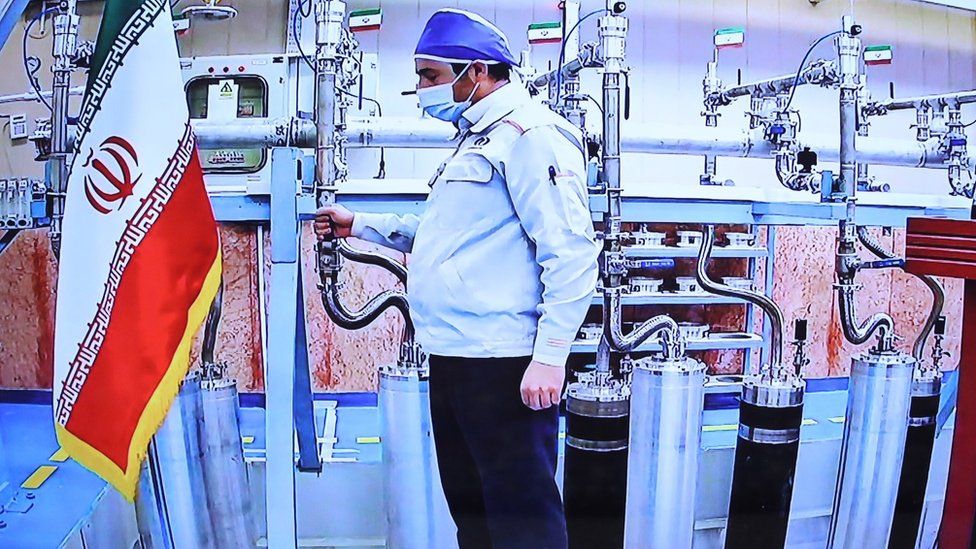Iran vows revenge for ‘Israeli’ attack on Natanz nuclear site
The Iranian foreign minister has said his country will “take revenge” for an attack on an underground nuclear site, for which it has blamed Israel.
Iranian officials said the Natanz uranium enrichment plant was the target of “nuclear terrorism” on Sunday, after initially reporting a power failure.
New advanced centrifuges to enrich uranium had just been activated there.
Israel has not commented, but public radio cited intelligence sources as saying it was a Mossad cyber operation.
They said this had caused more extensive damage than Iran had reported.
US intelligence officials told the New York Times that a large explosion had completely destroyed the independent internal power system that supplied the centrifuges inside the underground facility.
They estimated it could take at least nine months to resume enrichment there.
In recent days, Israel has stepped up its warnings about Iran’s nuclear programme amid efforts to revive a 2015 nuclear deal that was abandoned by former US President Donald Trump.
His successor, Joe Biden, has said he wants to return to the landmark accord.
But Iran and the five other world powers still party to it – China, France, Germany, Russia and the UK – need to find a way for him to lift US sanctions and for Iran to return to the agreed limits on its nuclear programme.
Iran nuclear crisis: The basics
- World powers don’t trust Iran: Some countries believe Iran wants nuclear power because it wants to build a nuclear bomb – it denies this.
- So a deal was struck: In 2015, Iran and six other countries reached a major agreement. Iran would stop some nuclear work in return for an end to harsh penalties, or sanctions, hurting its economy.
- What is the problem now? Iran re-started banned nuclear work after former US President Donald Trump pulled out of the deal and re-imposed sanctions on Iran. Even though new leader Joe Biden wants to rejoin, both sides say the other must make the first move.
“The Zionists want to take revenge because of our progress in the way to lift sanctions,” Iranian Foreign Minister Mohammad Javad Zarif was quoted by state media as saying on Monday.
“They have publicly said that they will not allow this. But we will take our revenge from the Zionists.”
Foreign ministry spokesman Saeed Khatibzadeh later told a news conference in Tehran that Israel was “of course” behind the attack on Natanz.
“This incident, fortunately, did not cause any damage to human lives or the environment. However, it could have been a catastrophe. This is a crime against humanity and carrying out such actions is in line with the essence of the Zionist regime,” he said.
Mr Khatibzadeh said only the least efficient “IR1” centrifuges were damaged in the incident, and that they would be replaced with advanced ones.
Enriched uranium is produced by feeding uranium hexafluoride gas into centrifuges to separate out the most suitable isotope for nuclear fission, called U-235.
The nuclear deal only allows Iran to use IR1 centrifuges to produce limited quantities of uranium enriched up to 3.67% concentration, which can be used to produce fuel for commercial nuclear power plants. Uranium that is enriched to 90% or more can be used to make nuclear weapons.
Iran, which insists it does not want nuclear weapons, has retaliated against the sanctions reinstated by the Trump administration by rolling back key commitments under the accord.
These have included operating advanced centrifuges, resuming enrichment to 20% concentration, and building a stockpile of that material.








